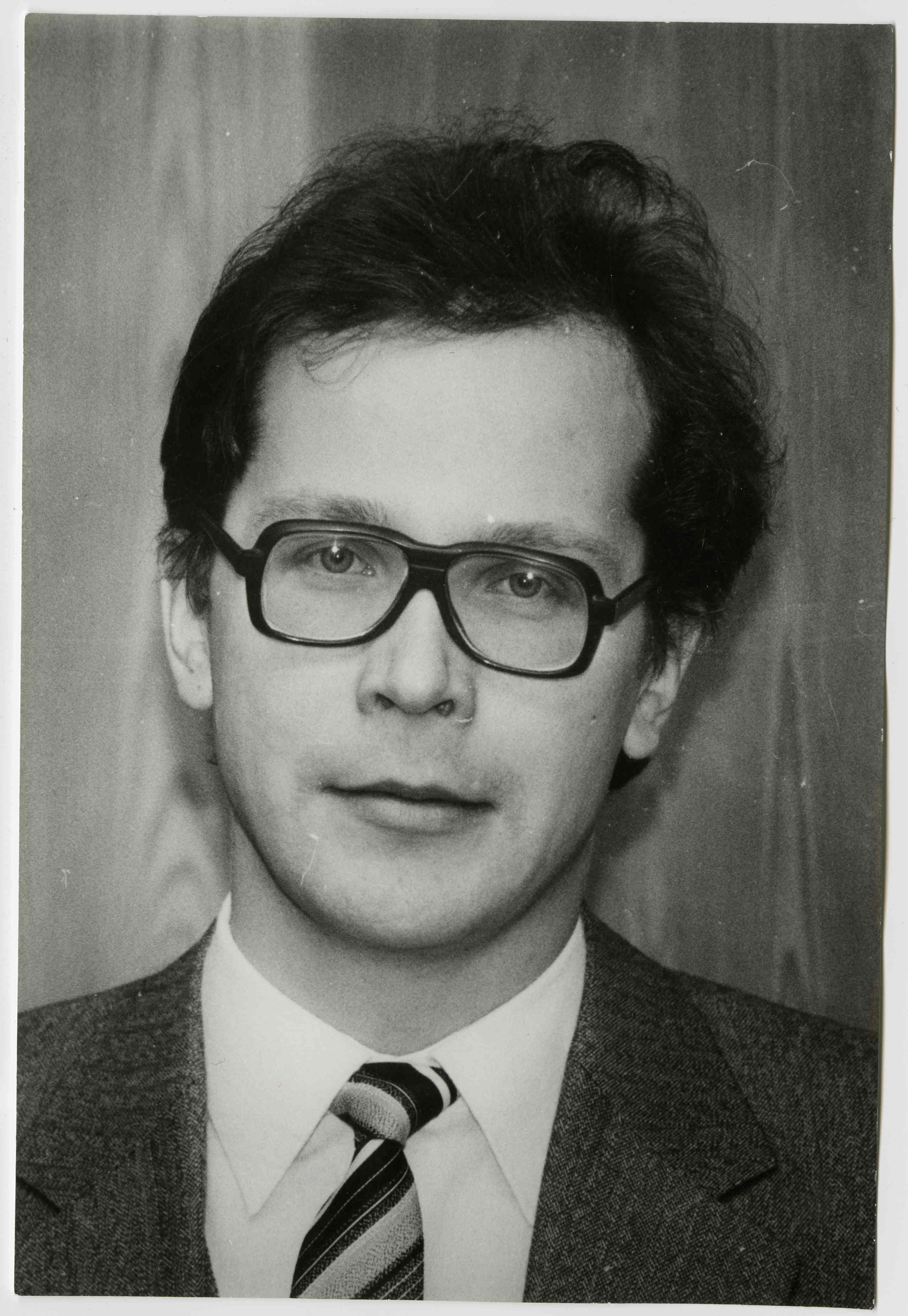
Jaan Undusk
Jaan Undusk (b. 14. XI 1958) is a literary scholar, prose writer and playwright.
He was born in Otepää, educated in Tallinn and Tartu, and from 1977 to 1982 studied Estonian language and literature at the Tartu State University. He defended his thesis for the degree of Candidate in Philology in 1986 at the Institute of Language and Literature of the Academy of Sciences of the Estonian SSR with the topic ‘The Role of Friedebert Tuglas in the Development of the Theory of Style in Estonian Fiction’. He has worked at the Institute of Language and Literature and at the Under and Tuglas Literary Centre of the Estonian Academy of Sciences, and has been its director since 2000. He has been a visiting lecturer at the universities of Frankfurt-am-Main and Tallinn. He has furthered his studies at the Institut für die Wissenschaften vom Menschen in Vienna, the Herder Institute in Marburg, the University of Cambridge, at the Academies of Sciences of Austria and Hungary in Vienna and Budapest, and in Paris at the École des Hautes Études en Sciences Sociales in Paris, among others. He has been a member of Wellesto since 1987, the Estonian Goethe Society since 1988, the Austrian Society for Germanistics since 1996 and the ICLA since 1998. He has been a member of the Writers’ Union since 1990. He became member the Estonian Academy of Sciences in 2007. He belongs to several colleges, commissions and councils.
He made his literary debut with poetry in the almanac Salong I in 1978. This was followed in 1979 by a short story in the journal Looming. The short story Sina, Tuglas (‘You, Tuglas’, 1986) attracted attention and debate, as did his textually dense first novel Kuum. Lugu noorest armastusest (‘Hot. A Story of Young Love’, 1990), which is associated with the renewal of prose in the early nineties. The work is characterized by luxuriant use of language, and an abundant intertwining of modifiers, circumlocutions and imagery. Intertextuality plays an important part in it. With its erotic undercurrents, in the foreground of the novel is a rephrasing of the world, and of love as well.
A broad geographical and cultural grasp and a dense networks of associations and allusions characterizes Undusk’s travelogue Teekond Hispaania (‘The Road to Spain’, 2016) and the plays Goodbye Vienna (1999), Quevedo (2003), which is set in 17th-century Spain, Boulgakoff (2006), which centres around Mikhail Bulgakov and the relations between power and the spirit, and Suur Siberimaa (‘Great Siberian Land’, 2020), which is based on Jaan Kross’ Siberian experiences.
Undusk is just as graceful a wordsmith and interpreter in meta-literature as in fiction. Undusk entered the arena of literary theory and history in the eighties, so that by now he is one of the most significant and wide-ranging thinkers in Estonia, whose range extends from linguistics and literary scholarship, general history and art history, into theology and philosophy. For Undusk the work of Tuglas has an important place, and so does Baltic-German literature and culture, and its relationship to Estonian literature and culture. His treatments of Estonian history through the Baltic German prism have gained attention. Undusk’s collection of texts on linguistic philosophy, delving into the hinterland of language and textual creation, Maagiline müstiline keel (‘Magical, Mystical Language’, 1998) has left its mark on Estonian culture.
Jaan Undusk has been given the following awards, among others:
– The F. Tuglas short story prize in 1987 for Sina, Tuglas (‘You, Tuglas’, 1986) and in 2003 for Armastus raamatu vastu (‘Love for a Book’, 2002)
– The Betti Alver debut prize in 1990 for Kuum. Lugu noorest armastusest (1990)
– The international J.G. von Herder award from the University of Vienna in the field of comparative literature (1995)
– Annual prize of the Cultural Endowment of Estonia in 1996 for Preestriaia pihtimus (‘Confession in the priest’s garden’), Sissejuhatus Tuglase kriitikasse (‘Introduction to Tuglas criticism’), and Kommentaarium Tuglase “Kogutud teoste” VII köitele (‘Commentary on vol. VII of Tuglas’ collected works’), in 1998 for Maagiline müstiline keel and in 2017 for Eesti kirjanike ilmavaatest (‘The Estonian Writers’ World-view’, 2016)
– The Writers’ Union essay prize (1997)
– The Drama Endowment Annual Award for Goodbye Vienna (1999)
– The Literature Endowment Annual Award for compiling Friedebert Tuglas. Valik proosat (‘Friedebert Tuglas. A Selection of Prose’, 2009)
– The competition award of the Estonian Drama Agency in 2003 for Quevedo and in 2005 for Boulgakoff
– The annual prize of the Estonian Theatre Union for original drama for Boulgakoff (2009)
– The Go Travel company’s prize for the best travel book of the year, Teekond Hispaania (2016)
– The Order of the White Star, III class, conferred by the President of the Republic of Estonia (2001)
– Annual prizes awarded by the journals Looming, Keel ja Kirjandus, Vikerkaar and Akadeemia and the weekly Sirp.
A. K. (Translated by C. M.)
Books in Estonian
Novels
Kuum. Lugu noorest armastusest. Tallinn: Eesti Raamat, 1990, 332 lk.
Plays
Quevedo. Tallinn: Perioodika (Loomingu Raamatukogu), 2003, 135 lk.
Boulgakoff. Tallinn: Eesti Draamateater, 2008, 120 lk.
Suur Siberimaa. Tallinn: Eesti Draamateater, 2020, 164 lk.
Travel books
Teekond Hispaania: üks luhtunud reisikiri. Tallinn: Kultuurileht (Loomingu Raamatukogu), 2016, 139 lk.
Literary criticism
Realismi mõiste ümber: F. Tuglase “realism” ja sajandivahetuse kultuur. Tallinn: Eesti NSV Teaduste Akadeemia, 1986, 84 lk.
Maagiline müstiline keel. Tallinn: Virgela, 1998, 348 lk.
Eesti kirjanike ilmavaatest. Tartu: Ilmamaa, 2016, 919 lk. [Sari ‘Eesti mõttelugu’.]



